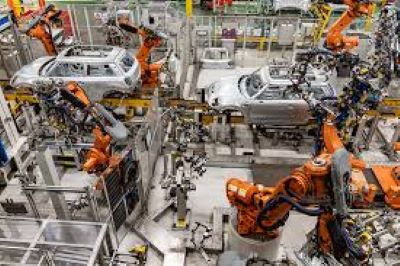Car industry braced for impact of Trump’s 25% import tariffs

UK motor industry bosses were expected to meet ministers in a bid to protect the country’s car plants after President Trump announced 25% tariffs on all vehicles imported into the US.
With high-level UK-US talks continuing, ministers will attempt to assure car manufacturers that they are working with their counterparts in Washington to prevent a damaging trade year.
The industry is understood to be seeking a support package from the Government to manage any disruption caused by the tariffs.
The US is Britain’s second largest car export market after the EU, worth around £7.6bn.
Last year, UK car plants shipped more than 101,000 vehicles – mainly premium and luxury cars – to the US, representing just under 17% of all car exports. The industry provides work for around 813,000 people, with almost 200,000 employed directly in manufacturing.
The Society of Motor Manufacturers and Traders (SMMT), which represents UK car makers, yesterday branded the move – due to come into effect next Wednesday – as “disappointing”, while analysts fear it could be hugely damaging for an industry already battling falling sales and rising production costs.
It said it wanted to see a “mutually beneficial relationship” between the US and UK auto industries.
Aston Martin’s US sales generated around a third of its £1.6bn revenue in 2024, more than the combined revenue it made in the UK and Asia Pacific.
Its share price dropped by 6.7% on Thursday morning, reaching a low of 67p before closing at 68.7p. It marked the biggest drop for car manufacturers on the FTSE 250 in London.
The US represents the largest overseas sales market for Jaguar Land Rover (JLR), which employs around 11,000 people in the UK, primarily at its manufacturing site in Solihull and its product engineering centre and head office in Gaydon, Warwickshire.
Tata Motors, its parent company, saw shares drop by 5%.
US import tariffs would also hit German car giant BMW’s three UK plants – Oxford, Swindon and Hams Hall, near Birmingham – which employ a total of around 8,000 people and are mainly involved in Mini production.
The iconic British marque has been a strong seller in the US. Nearly 26,300 Minis were sold in the US last year.
Despite being a fall on the 33,497 sold in 2023 due to a planned model changeover and the launch of a new product portfolio, the US remains an important market for the Mini.
Stellantis, the parent company of Vauxhall, will next month close its 120-year-old Luton van factory and relocate production to its Ellesmere Port plant in Cheshire, where it employs more than 1,000 people.
Ellesmere Port, the UK’s first electric vehicle-only manufacturing facility, produces compact electric vans, including the Citroën ë-Berlingo, Vauxhall Combo Electric, Opel Combo Electric, Peugeot E-Partner and Fiat Professional E-Doblo.
Japanese car giant Toyota employs around 3,000 people at its vehicle manufacturing plant at Burnaston, near Derby – where it produces the Corolla Hatchback and Corolla Touring Sports models – and an engine plant on Deeside, North Wales.
The UK’s largest car production site is Nissan’s plant at Sunderland where it employs around 6,000 people building the Qashqai, Juke and electric Leaf hatchback models. Last year the plant exported around 73,500 cars to the US, just over 10% of its total output.
The SMMT said the UK and US auto industries had a long-standing and productive relationship, “with US consumers enjoying vehicles built in Britain by some iconic brands, while thousands of UK motorists buy cars made in America”.
It added: “Rather than imposing additional tariffs, we should explore ways in which opportunities for both British and American manufacturers can be created as part of a mutually beneficial relationship, benefitting consumers and creating jobs and growth across the Atlantic.”
It urged both sides to come together immediately and “strike a deal that works for all”.
Asked about the tariffs in media interviews yesterday, Chancellor Rachel Reeves said “extensive talks” were taking place with the US to protect trade between the countries.
Meanwhile British Chambers of Commerce head of trade policy William Bain called for “intensive dialogue” between the UK Government and the US administration to reach a mutually beneficial agreement on trade.
“Businesses were already looking with trepidation towards next week’s planned reciprocal tariffs before this fresh upheaval was announced,” he said.
“Around half of the cars purchased in the US are imported so this will pass through into much higher costs for US consumers. If fully extended to all components it will affect supply chains too.
“Piling these tariffs on top of the others already expected on 2 April, will sap business confidence and add further uncertainty for both UK and US firms.”








